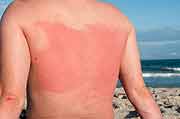- Could Your Grocery Store Meat Be Causing Recurring UTIs?
- Are You Making This Expensive Thermostat Error This Winter?
- Recognizing the Signs of Hypothyroidism
- 10 Strategies to Overcome Insomnia
- Could Artificial Sweeteners Be Aging the Brain Faster?
- Techniques for Soothing Your Nervous System
- Does the Water in Your House Smell Funny? Here’s Why
- Can a Daily Dose of Apple Cider Vinegar Actually Aid Weight Loss?
- 6 Health Beverages That Can Actually Spike Your Blood Sugar
- Treatment Options for Social Anxiety Disorder
It’s Better to Prevent a Sunburn Than to Treat One, Dermatologist Says


The long-awaited arrival of summer means people will be spending more time outdoors. So, an expert warns, it’s especially important at this time of year to take steps to protect your skin from the sun.
Along with considerable pain and discomfort, sunburn can cause long-term harm to your skin, explained Dr. Elizabeth Martin, a dermatologist in Hoover, Ala.
“Although sunburn may seem like a temporary condition, it leaves behind long-lasting damage to the skin that increases a person’s risk for getting skin cancer,” Martin, who is also a spokesperson for the American Academy of Dermatology, said in an academy news release.
She offered a number of tips to help prevent sunburn and reduce your risk of skin cancer.
When you’re outside, wear a long-sleeved shirt, long pants, a wide-brimmed hat and sunglasses. Try to stay in the shade, especially when the sun’s rays are strongest between 10 a.m. and 2 p.m.
Apply broad-spectrum, water-resistant sunscreen with a sun protection factor (SPF) of 30 or more on all exposed areas of your skin. Broad-spectrum sunscreens provide protection against both ultraviolet A and ultraviolet B rays. Reapply sunscreen about every two hours — even on cloudy days — and after swimming or sweating.
“Sunburn is better prevented than treated, but if you do get a sunburn, it’s important to begin treating it as soon as you notice it,” Martin said. “The first step you should take is to get out of the sun — and preferably indoors.”
She offered some tips to help soothe and heal sunburned skin. Drink extra water to prevent dehydration and consider taking aspirin or ibuprofen to help reduce swelling, redness and discomfort.
If your skin blisters, do not pop the blisters. They help your skin heal and protect you from infection.
Taking frequent cool baths or showers can help relieve the pain, as can moisturizers that contain aloe vera or soy. An over-the-counter hydrocortisone cream may be helpful for sunburned areas that are especially uncomfortable. Never use “-caine” products (such as benzocaine) to treat sunburn. They may irritate the skin or cause an allergic reaction, Martin said.
“Unfortunately, the first signs of sunburn can take two to three hours to appear, making it especially important to carefully monitor your skin during outdoor activities,” Martin noted.
“If you get sunburned and you have blisters that cover a large area, such as your entire back, or if you have chills, a headache or a fever, seek medical care immediately,” she added.
More information
The U.S. National Library of Medicine has more about sun exposure.
Source: HealthDay
Copyright © 2026 HealthDay. All rights reserved.










